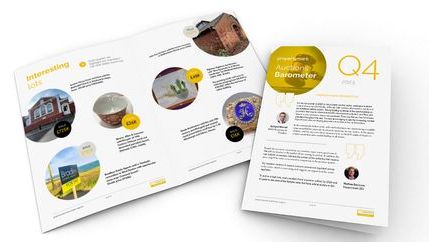
It’s a common misconception that auctions only offer fixer-upper properties suitable for investors seeking to renovate and resell, but that is far from the case. The efficiency of the auction process means that properties of all shapes, sizes and prices are bought daily, with listings offering something for everyone.
The variety of properties Propertymark auctioneer members have on offer across the country shows the range they have to offer for both buyers and sellers. This is reflected in Propertymark’s most recent Auction Barometer report, which showed a significant increase in the number of lots sold at residential auctions, and the amount raised, compared to 2023.
Auctions Barometer
The Auctions Barometer is based on a survey of NAVA Propertymark valuers and auctioneers combined with an analysis of key economic forecasts for the UK to equip interested audiences with the most up-to-date information on the sector for the coming quarter.
What’s happening to Stamp Duty Land Tax (SDLT)?
SDLT rates are increasing for the lower end of the market. Currently, no SDLT is charged on the first £250,000, but from 1 April 2025, this will drop to the first £125,000.
This means that someone buying a property worth £250,000 will pay 0% on the first £125,000, and 2% on the remaining £125,000 (that’s a SDLT bill of £2,500).
The Stamp Duty threshold for first-time buyers will also decrease from £425,000 to £300,000, resulting in an extra tax liability which could hinder affordability.
A full list of Stamp Duty rates for residential property is available on GOV.UK →
Flexibility to choose your mode of sale
There are two different types of auctions: conditional and unconditional.
Unconditional or traditional auction sales are legally binding, which means the buyer and seller swap contracts once the gavel falls. This offers both parties fast, secure transactions, and a completion date 20 working days later once the buyer pays a 10% deposit.
Conditional, or modern, auctions are not legally binding at the point the gavel falls and require the successful bidder to pay a reservation fee on top of the property purchase price as a financial commitment to the sale.
With both auction types, the highest bidder secures the property, which is great news for sellers, who could find they achieve a larger profit than they would via private treaty. Property auctions are a compelling option for buyers because they provide the convenience of a chain-free purchase, possibly conducted online, for a quicker exchange and completion.
Propertymark has a useful consumer guide to help those looking to buy at auction.
Propertymark’s Find an Expert tool can help you find a NAVA Propertymark agent near you.
Find an expert
Search for a Propertymark Protected estate agent, letting agent or auctioneer to ensure that you will be talking with a professional who will give you the most up-to-date advice and guidance.








